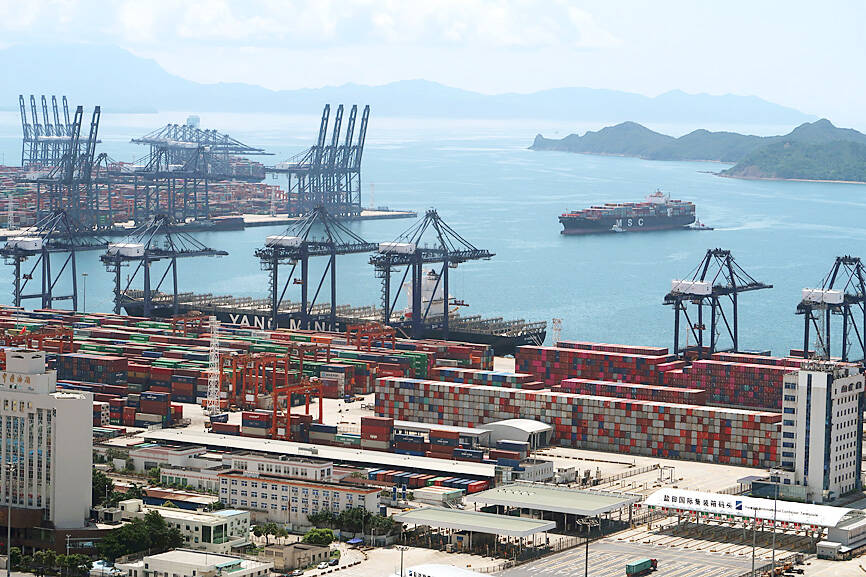China yesterday announced tariffs on more than US$2.6 billion worth of Canadian agricultural and food products, retaliating against levies Ottawa introduced in October last year and opening a new front in a trade war largely driven by US President Donald Trump’s tariff threats.
The levies, announced by the Chinese Ministry of Commerce and scheduled to take effect on March 20, match the 100 percent and 25 percent import duties Canada slapped on China-made electric vehicles and steel and aluminum products just more than four months ago.
By excluding canola — which is also known as rapeseed, and was one of Canada’s top exports to the world’s No.1 agricultural importer prior to China investigating it for anti-dumping last year — Beijing might be keeping the door open for trade talks.

Photo: Reuters
However, the tariffs also serve as a warning shot, analysts said, with the Trump administration having signaled it could ease 25 percent import levies the White House is threatening Canada and Mexico with if they apply the same extra 20 percent duty he has slapped on Chinese goods over fentanyl flows.
“Canada’s measures seriously violate World Trade Organization rules, constitute a typical act of protectionism and are discriminatory measures that severely harm China’s legitimate rights and interests,” China’s commerce ministry said in a statement.
China would apply a 100 percent tariff to more than US$1 billion of Canadian rapeseed oil, oil cakes and pea imports, and a 25 percent duty on US$1.6 billion worth of Canadian aquatic products and pork.
“The timing may serve as a warning shot,” said Dan Wang (王丹), China director at Eurasia Group in Singapore. “By striking now, China reminds Canada of the cost of aligning too closely with American trade policy.”
“China’s delayed response [to Ottawa’s October tariffs] likely reflects both capacity constraints and strategic signaling,” she said. “The commerce ministry is stretched thin, juggling trade disputes with the US and European Union.”
“Canada, a lower priority, had to wait its turn,” she added.
Canadian Prime Minister Justin Trudeau in August last year said that Ottawa was imposing the levies to counter what he called China’s intentional state-directed policy of overcapacity, following the lead of the US and the EU, both of which have also applied import levies on Chinese-made electric vehicles.
In response, China in September last year launched an anti-dumping investigation into Canadian canola imports. More than half of Canada’s canola exports go to China and the trade was worth US$3.7 billion in 2023, the Canola Council of Canada said.

NEXT GENERATION: The four plants in the Central Taiwan Science Park, designated Fab 25, would consist of four 1.4-nanometer wafer manufacturing plants, TSMC said Taiwan Semiconductor Manufacturing Co (TSMC, 台積電) plans to begin construction of four new plants later this year, with the aim to officially launch production of 2-nanometer semiconductor wafers by late 2028, Central Taiwan Science Park Bureau director-general Hsu Maw-shin (許茂新) said. Hsu made the announcement at an event on Friday evening celebrating the Central Taiwan Science Park’s 22nd anniversary. The second phase of the park’s expansion would commence with the initial construction of water detention ponds and other structures aimed at soil and water conservation, Hsu said. TSMC has officially leased the land, with the Central Taiwan Science Park having handed over the

AUKUS: The Australian Ambassador to the US said his country is working with the Pentagon and he is confident that submarine issues will be resolved Australian Ambassador to the US Kevin Rudd on Friday said that if Taiwan were to fall to China’s occupation, it would unleash China’s military capacities and capabilities more broadly. He also said his country is working with the Pentagon on the US Department of Defense’s review of the AUKUS submarine project and is confident that all issues raised will be resolved. Rudd, who served as Australian prime minister from 2007 to 2010 and for three months in 2013, made the remarks at the Aspen Security Forum in Colorado and stressed the longstanding US-Australia alliance and his close relationship with the US Undersecretary

‘WORLD WAR III’: Republican Representative Marjorie Taylor Greene said the aid would inflame tensions, but her amendment was rejected 421 votes against six The US House of Representatives on Friday passed the Department of Defense Appropriations Act for fiscal 2026, which includes US$500 million for Taiwan. The bill, which totals US$831.5 billion in discretionary spending, passed in a 221-209 vote. According to the bill, the funds for Taiwan would be administered by the US Defense Security Cooperation Agency and would remain available through Sept. 30, 2027, for the Taiwan Security Cooperation Initiative. The legislation authorizes the US Secretary of Defense, with the agreement of the US Secretary of State, to use the funds to assist Taiwan in procuring defense articles and services, and military training. Republican Representative

TAIWAN IS TAIWAN: US Representative Tom Tiffany said the amendment was not controversial, as ‘Taiwan is not — nor has it ever been — part of Communist China’ The US House of Representatives on Friday passed an amendment banning the US Department of Defense from creating, buying or displaying any map that shows Taiwan as part of the People’s Republic of China (PRC). The “Honest Maps” amendment was approved in a voice vote on Friday as part of the Department of Defense Appropriations Act for the 2026 fiscal year. The amendment prohibits using any funds from the act to create, buy or display maps that show Taiwan, Kinmen, Matsu, Penghu, Wuciou (烏坵), Green Island (綠島) or Orchid Island (Lanyu, 蘭嶼) as part of the PRC. The act includes US$831.5 billion in